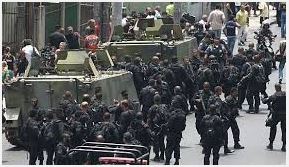About 2,750 Brazilian soldiers and military police on April 5th invaded a 4 square miles complex of Rio de Janeiro slums with armored personnel, according to the Rio Times newspaper. More than 1,000 police officers and marines had been trying all week to establish control over the ghetto before the opening of the World Cup competition on June 12th. But with rival drug gangs uniting forces to create what one cartel leader promised would be the “World Cup of Terror,” the Brazilian military was forced to move in and occupy a community of 130,000 through the games that run from July 12th through the final on Friday, July 13th.
By winning the right to host the FIFA World Cup, Brazil expected to financially benefit from what is considered the world’s greatest and most valuable single sports event. Brazil is the most victorious World Cup competitor, having won the championship five times. They last held the games in 1950, after the soccer tournament had been suspended since 1938 due to World War II. Brazil lost the 1950 deciding match by 2-1 to neighboring rival Uruguay, winner of the inaugural World Cup in 1930. Those Brazil games became a spectacular financial and social success by selling 1,045,246 tickets, a total that was not surpassed for another 16 years.
Marcos Williams Herbas Camacho, currently serving a life sentence for the murder of a Brazilian judge in 2003, is the avowed leader of the First Capital Command (PCC) that murdered over a hundred Sao Paolo police officers last year. He promised from prison in early 2013, that he would lead a “World Cup of Terror.”
The PCC joined forces with other drug cartels and “Black Blok” anarchists to lash out in tremendous violence on the streets of Rio de Janeiro and Sao Paolo on October 15, 2014. Although originally planned as a march in support of a teacher’s strike to protest the government’s choice to take money needed for schools, hospitals and public transportation and spend it on the hotels and arenas to be used for the 2014 World Cup, a million people turned out and rioters set cars on fire and assaulted police. The uprising was the biggest in recent Brazilian history and took police 27 hours to diffuse.
Brazilian President Dilma Rousseff told her nation they could receive $5 billion in benefits for hosting the 2014 World Cup. This also seemed politically attractive, given that national elections are scheduled less than three months after the games. But any severe disruptions could spoil “Brazil’s big party” and her re-election chances. She has set aside $800m to pay for extra security during the events and passed new laws that require masked protesters to identify themselves to the police, stiffens penalties for vandalism and requires organizers of demonstrations schedule protests with authorities.
The government had said they would maintain order by relying on unarmed “ninja squads,” consisting of 100 men units recruited from the biggest members of the police. Although the officers are only authorized to carry shields and batons, they were supposed to use martial arts such as ju-jitsu and immobilize violent demonstrators.
It seems that the 1,000 member ninja squads got “taken-out” in just a week by the heavily armed First Capital Command and their drug cartel allies. The Brazilian military is now committed to holding an area of Rio that has never been under effective police control. But just like any other occupation, an insurgency will grow and violence from improvised explosive devices and other types of terrorism are likely. But just like any other occupation, violence will grow and terrorism is likely. Do not be surprised the Brazil’s big party becomes a Friday 13th‘s “World Cup of Terror.”
The author welcomes feedback and will respond to comments by readers.

COMMENTS
Please let us know if you're having issues with commenting.